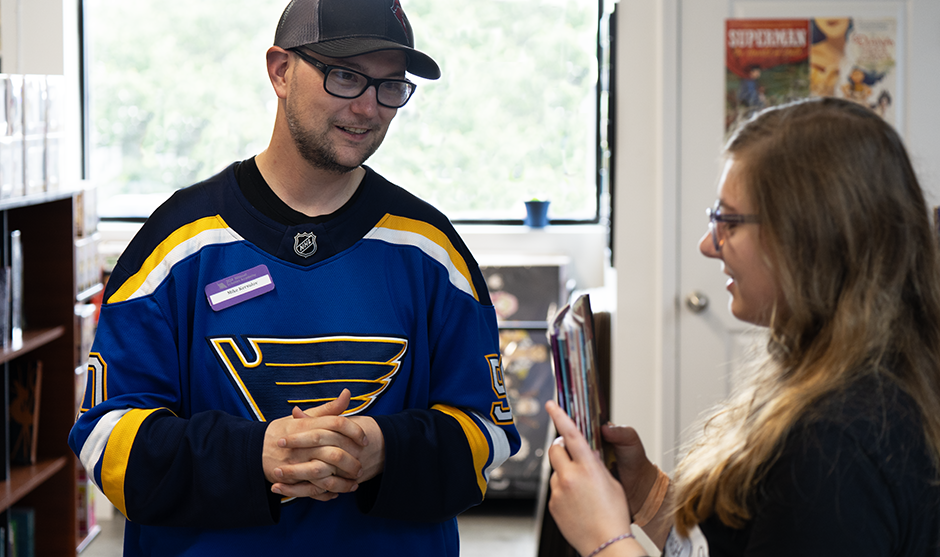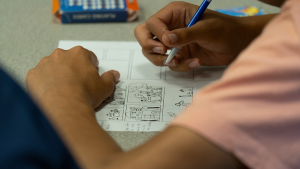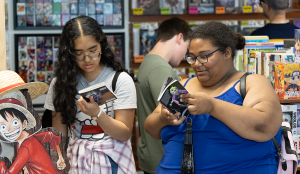Published on June 28, 2024

As Mike Kersulov began sharing what the upcoming three weeks would look like for students in his minor course – “Comics vs. the World” – part of his discussion focused on the variety of careers that the comic industry offers. Kersulov mentioned that there are even conferences devoted to the in-depth examination of the power of comic book storytelling. He said one of those conferences, hosted by the Comics Studies Society, would actually take place virtually during the Missouri Scholars Academy (MSA).
“The students immediately wanted to know if they could watch part of the conference, which is exactly what I wanted to hear,” Kersulov said.
Kersulov pulled up the conference schedule, letting the scholars know that they would only be able to watch on the third Wednesday of the academy. As he showcased what topics would be discussed that day, he lingered on one in particular – “Comics in the Classroom: Young Researchers of the Missouri Scholars Academy.” Kersulov was listed as the moderator of the panel.

“It definitely took them a minute to figure out what was going on,” Kersulov said. “One student even asked if it was real. I assured them that it was.”
Back in February, Kersulov had reached out to the Comics Studies Society, proposing a panel featuring MSA students. The discussion would showcase the work that scholars would do throughout the academy and focus on three primary topics – comics for the visually impaired; remixing poetry and comics; and artifactual literacy and memoir comics.
“It was super shocking,” said Ollie Pieples, a scholar from O’Fallon. “We thought it was a joke. We definitely gained the ultimate two truths and a lie factoid by speaking at this conference.”
Kersulov, a native of St. Louis who currently teaches English in Springfield, Nebraska, has been teaching a comics-centered course at the Missouri Scholars Academy for most of his 15 years as faculty. While the class has taken on different iterations, the heart of the course has stayed the same.
“The class explores storytelling with comic books and graphic novels and how they have influenced other forms, even our culture as a whole,” Kersulov said. “We cover the foundations of sequential art that help create the combination of the verbal and visual text, reading some of the mostly highly praised works in the field. Students looked at a variety of comics, including superheroes, manga, webtoons, zines, picto-essays, travel diaries and memoirs. Scholars created their own comics and applied new theories.”
Kersulov kicked off the panel and was followed by three student speakers – Pieples, Evan Marshall and Journey Platt. Pieples spoke on the artifactual literacy and memoir comics. Marshall, who is from Columbia, led the discussion on poetry and comics. Platt, from Odessa, spearheaded the comics for the visually impaired topic.
“This class was really cool,” Platt said. “It made me rethink what comic book storytelling can do. I had a great group to work with for my presentation, too. Everyone was amazing.”
“Being able to participate in the conference really validated our work,” Marshall added. “I became really passionate about everything we were doing. It was super rewarding to share our work.”

Students had plenty of work to share during the conference. They created their own memoir comics, drawing and creating dialogue to showcase their stories. The group visited a local comic shop, Distant Planet Comics and Collectibles, where they searched for titles that interested them and heard from industry experts. To help prepare them for the comics for the visually impaired discussion, the students met with two blind individuals – Gary and Debbie Wunder from Columbia – to talk through how they could potentially aid them.
“Gary was blind from birth and Debbie gradually lost her sight over the years,” Platt said. “It was really interesting to hear both perspectives and discuss what works and what doesn’t work. They were incredibly kind and helped us understand how they experience the world, especially when related to consuming media.”
Kersulov said he was thrilled with how the conference went, as well as the class in general. And in true MSA community fashion, one of the audience members, who is a professor at the University of Illinois Urbana-Champaign, is an MSA alum.
“It was all a bit surreal,” Kersulov said. “As an academic who has attended numerous conferences over the years, I’ve never seen a panel led by high school students. You’ll see the occasional graduate student panel, or an undergraduate might be featured with their professor. I’m really proud of the work our scholars put into this project. They should all be incredibly pleased with their efforts.”